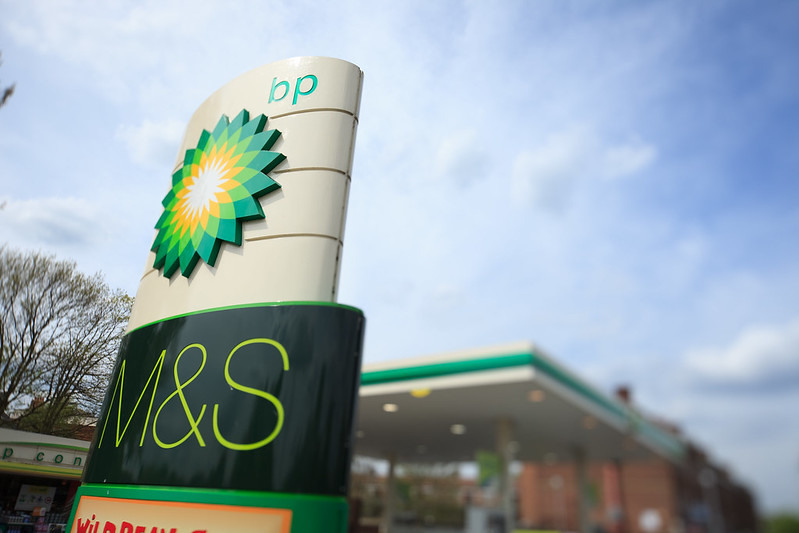BP has announced plans to increase its renewables capacity to 50GW, as it increases investment tenfold.
Along with its half year results – which saw the oil and gas major slash its dividend in half – BP has released more details on how it will become a net zero company by 2050 or sooner.
The company has announced the ambitious target of increasing its renewables by 2030, growing its capacity twentyfold from just 2.5GW in 2019. Currently BP has a global pipeline of 10GW of solar through its joint venture with Lightsource BP, an ambition that is on track to hit 2023 and will likely now be scaled up.
This includes playing an active role in the UK market, with Lightsource BP having heralded the return of the large-scale solar build-out at the end of 2019 and announcing it was setting its sights on 1GW of capacity in the country. Already, this has seen it granted planning permission for a 50MW solar farm in Durham.
In the US, the company also has a portfolio of 1,679MW of onshore wind capacity from nine wind farms.
Along with renewables, it will target an increase in bioenergy from 22,000 b/d in 2019 to more than 100,000 b/d by 2030, and seek to establish itself in the hydrogen sector with a 10% share of core markets, along with the carbon capture, utilisation and storage (CCUS) sector.
CEO Bernard Looney said BP could bring over 100 years of experience “steeped in the world of energy” to its transition from a fossil fuel company to an integrated energy company.
“We understand energy markets deeply, and have developed unique capabilities in trading, marketing, technology and innovation,” he continued, adding that “we are not starting from scratch in this new world”.
“From our Lightsource BP joint venture – now in 13 countries – to our electric vehicle charging partnership with DiDi in China, and our industry-leading convenience partnerships with M&S in the UK and REWE in Germany – we are already building scale and capability.”
As part of its strategy, it will increase its electric vehicle charging points from 7,500 to over 70,000. Currently its BP Chargemaster arm is rolling out rapid chargers in the UK, where it is developing a 150kW network.
To reach its decarbonisation goals, BP is increasing its low carbon investment to around $5 billion (£3.83 billion) a year by 2030.
Along with this growth in renewables, the company will reduce its production of oil and gas by 40% by actively managing its portfolio. It has also committed to undertaking no exploration in new countries.
It will partner with 10-15 cities and three core industries during this period as well, helping to double the company’s customer interactions to 20 million a day.
Helge Lund, BP’s chairman, added: “Energy markets are fundamentally changing, shifting towards low carbon, driven by societal expectations, technology and changes in consumer preferences. And in these transforming markets, BP can compete and create value, based on our skills, experience and relationships.
“We are confident that the decisions we have taken and the strategy we are setting out today are right for BP, for our shareholders, and for wider society.”
Dividend halved to help ‘reimagine energy and reinvent BP’
The company’s dividend has been ‘reset’ at 5.25 cents per share, it announced today, down from 10.5 cents per share, and this will stay fixed at this level to help manage the uncertainty created by COVID-19.
This marked change is in line with its plan to become more resilient it said, as the company commits to returning at least 60% of surplus cash as share buybacks to further support this.
BP’s Q2 results show it has lost $6.7 billion (£5.1 billion) in underlying replacement costs, a dramatic change in comparison to the same period on 2019 when there was a profit of $2.9 billion (£2.2 billion).
This was due to non-cash Upstream exploration write-offs the company said, which amounted to $6.5 billion (£5 billion) after tax. These were driven by the company’s long-term strategy and how that has impacted its price assumptions, along with record low oil and gas prices and dramatic reductions in demand drive by COVID-19.
Its reported loss for the quarter was $16.8 billion (£13 billion), a fall from a profit of $1.8 billion (£1.4 billion) during Q2 2019, again impact by a revision in price impacts as it sets it move away from oil production.
Looney continued: “These headline results have been driven by another very challenging quarter, but also by the deliberate steps we have taken as we continue to reimagine energy and reinvent BP. In particular, our reset of long-term price assumptions and the related impairment and exploration write-off charges had a major impact.
“Beneath these, however, our performance remained resilient, with good cashflow and – most importantly – safe and reliable operations.”
BP first announced that it would become a net zero company in February, with the newly appointed Looney stating the company would need to “fundamentally reorganise”. The impact of this has already been felt, with actions to become a “leaner, faster-moving and lower carbon company” accelerated due to challenges presented by COVID-19.
This includes cutting 10,000 jobs in an effort to reduce expenditure, and cutting £14 billion (US$17.5 billion) from the value of its assets.
BP was one of a host of oil and gas majors to commit to decarbonisation at the beginning of 2020, with Shell and Total also announcing their ambitions for net zero operations.





